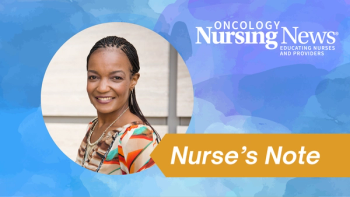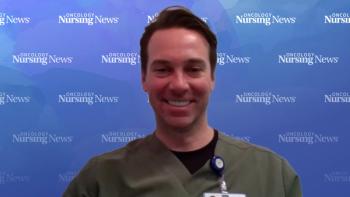
- September 2018
- Volume 12
- Issue 7
Impact of Goals of Care on Resource Use at End of Life
Researchers exam­ined whether there were differences in resource use at end of life between patients with advanced cancer who identified goals of care focused heavily upon survival versus those who identified goals of care heavily focused on quality of life.
Amy R. Lipson, PhD
Sara L. Douglas, PhD, RN
Amy R. Lipson, PhD, is a senior research associate, and Sara L. Douglas, PhD, RN is the Arline H. & Curtis F. Garvin Professor in Nursing Excellence and assistant dean for research at the Frances Payne Bolton School of Nursing, Case Western Reserve University, Cleveland, Ohio.
Gathering data on goals of care for patients with advanced cancer throughout the illness trajectory, including end-of-life (EOL) goals, can help guide treatment decisions.1,2 Communication between the health­care team and oncology patients can increase the likelihood that patients receive treatment aligned with their own
Using a sub-sample from a
In this sample of 168 patients with advanced cancer who died during the 15-month study period, the majority of the sample were Caucasian (69.0%) and female (51.8%) and had a diagnosis of gastrointestinal cancer (66.1%), an ECOG performance score of 1 (64.9%), and a mean age of 63.9 (SD = 10.4). Prior to death, 62.9% had an advance directive, 54.2% had received palliative care, and 47.6% had received hospice services. Within 30 days prior to death, 45.5% of the sample had at least 1 visit to the emergency department and 58.1% had at least 1 hospital­ization (with 19% of those being admitted to an intensive care unit).
To further examine how the patients’ goals of care were associated with resource use at EOL, we focused on data in the tails of the goals-of-care scale. We compared resource use between those falling in the group more focused on survival with those more focused on QOL. Those focused more on QOL were more likely to enroll in hospice. All other resource use comparisons (emergency department visits, hospitaliza­tions, intensive care, and palliative care) were not statisti­cally significant. We found that by asking patients a sim­ple question regarding their goals of care, we could assess whether they wanted care that was focused more on survival or QOL. In addition, we found that those who favored goals of care emphasizing QOL had EOL care that was consistent with this goal.
Oncology nurses are in a unique position to talk with patients regarding their goals of care.3 Since the establish­ment of the End-of-Life Nursing Education Consortium in 2000, a collaboration between the American Association of Colleges of Nursing and City of Hope, Duarte, California, to improve palliative care nationwide, momentum has been building to create programs that train nurses to initiate these kinds of discussions with patients. This type of open com­munication can ensure that patient information regarding goals of care is communicated to the healthcare team and, as a result, enhance the likelihood that the patient receives EOL care consistent with their own goals.
REFERENCES
- You JJ, Fowler RA, Heyland DK; Canadian Researchers at the End of Life Network (CARENET). Just ask: Discussing goals of care with patients in hospital with serious illness. CMAJ. 2014;186(6):425-432. doi:10.1503/ cmaj.121274.
- Balogh EP, Ganz PA, Murphy SB, Nass SJ, Ferrell BR, Stovall E. Patient-centered cancer treatment planning: Improving the quality of oncology care. Summary of an Institute of Medicine Workshop. Oncol­ogist. 2011;16(12):1800-1805. doi:10.1634/theoncologist.2011-0252.
- Wittenberg E, Ferrell B, Goldsmith J, Buller H, Neiman T. Nurse communication about goals of care. J Adv Pract Oncol. 2016;7(2):146-154.
- Lipson AR, Douglas SL. Factors influencing care decisions for patients with advanced cancer. Oncol Nurs News. 2015;9(2):53.
Articles in this issue
about 7 years ago
Prostate Cancer Screening Is Controversialover 7 years ago
Novel RET Inhibitor Tested in Patients With NSCLC, MTCover 7 years ago
Celebrating Nurses All Year Longover 7 years ago
The Role of Volunteers in an Oncology Settingover 7 years ago
The New MM: Medical Marijuanaover 7 years ago
Pursuing a Calling: From Convent to Cancer CareNewsletter
Knowledge is power. Don’t miss the most recent breakthroughs in cancer care.




















































































